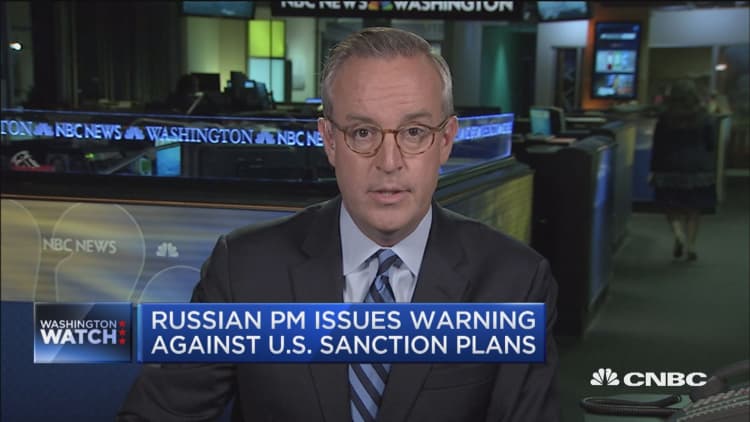
Russia's Prime Minister Dmitry Medvedev reportedly warned the U.S. on Friday that sanctions it plans to impose against Moscow over the nerve-agent attack of a former spy living in Britain could be treated as a declaration of an economic war.
Speaking during a trip to the Kamchatka region of Russia, Reuters reported Medvedev as saying: "I would not like to comment on talks about future sanctions, but I can say one thing: If some ban on banks' operations or on their use of one or another currency follows, it would be possible to clearly call it a declaration of economic war."
"And it would be necessary, it would be needed to react to this war economically, politically, or, if needed, by other means. And our American friends need to understand this," he added.
President Donald Trump's administration said Wednesday it plans to punish Russia with sanctions for poisoning Sergei Skripal and his daughter Yulia Skripal with a chemical weapon earlier this year. In a statement, spokeswoman Heather Nauert said the sanctions will go into effect around August 22.
Skripal, a former Russian spy who became a double agent for the U.K., fell into critical condition after being poisoned in Britain on March 4. His daughter Yulia, who was visiting him from Moscow, was also poisoned.
Ruble tumbles to multi-year lows
The fear of further U.S. sanctions prompted a steep fall in Russia's currency on Thursday, with the ruble tumbling to its lowest dollar value in almost two years. The dollar hit its highest level against the ruble since November 2016 – the month Trump got elected, with one dollar buying as many as 66.7099 rubles on Thursday morning.
The greenback is up 5.8 percent against the Russian currency since the end of July, and up 14.6 percent since the start of this year. On Friday morning, the ruble was trading around 66.8797 at 09:00 Moscow time (02.00 a.m. ET).
Meanwhile, Russia's five-year credit default swaps (CDS) — which reflect the cost of insuring debt against default — rose to their highest level in nearly nine weeks on news of the sanctions. The country's CDS level hit its highest level since June 19 on Wednesday, climbing above 154 after trading around 133 earlier this week, according to data from IHS Markit.
The Kremlin has strongly denied any involvement in the Skripal attack and described the latest move by Washington as "draconian" and based on "far-fetched accusations."
Russia's embassy in the U.S. has said it continued to "strongly stand for an open and transparent investigation into the crime committed in Salisbury."
Second set of sanctions could follow
Trump has avoided commenting on the developments, which come just a few weeks after his controversial summit with Russian President Vladimir Putin in Helsinki, Finland.
During that meeting, he appeared to support his counterpart's claim that Russia did not meddle in the 2016 U.S. election, while America's intelligence agencies believe with unanimous certainty that it did. He later walked back his statements.
Nonetheless, the U.S. administration has said it is prepared to impose a second set of sanctions on Russia three months later, a senior State Department official said Wednesday, unless Russia can prove it has met certain criteria.
Those include no longer using chemical or biological weapons in violation of international law and allowing on-site inspections by the U.N., as well as providing other reliable assurances, the senior official said.
— CNBC's Kevin Breuninger and Natasha Turak contributed to this report.


